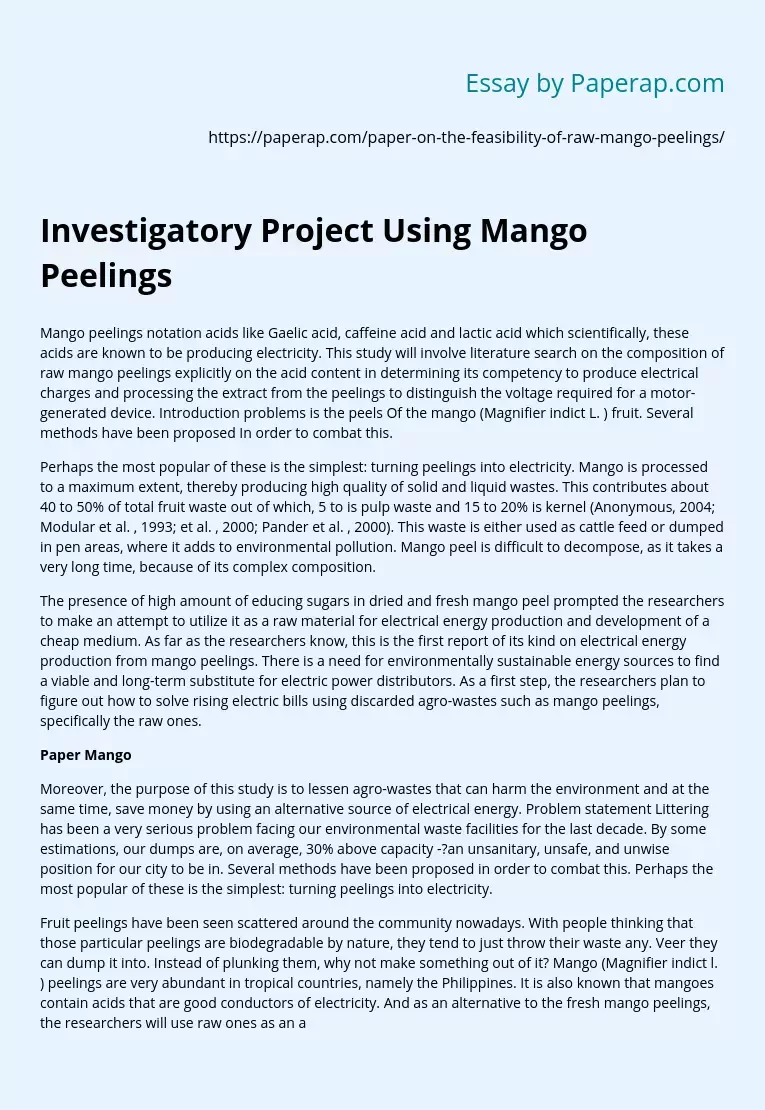Investigatory Project Using Mango Peelings
Mango peelings notation acids like Gaelic acid, caffeine acid and lactic acid which scientifically, these acids are known to be producing electricity. This study will involve literature search on the composition of raw mango peelings explicitly on the acid content in determining its competency to produce electrical charges and processing the extract from the peelings to distinguish the voltage required for a motor-generated device. Introduction problems is the peels Of the mango (Magnifier indict L. ) fruit. Several methods have been proposed In order to combat this.
Perhaps the most popular of these is the simplest: turning peelings into electricity. Mango is processed to a maximum extent, thereby producing high quality of solid and liquid wastes. This contributes about 40 to 50% of total fruit waste out of which, 5 to is pulp waste and 15 to 20% is kernel (Anonymous, 2004; Modular et al. , 1993; et al. , 2000; Pander et al. , 2000). This waste is either used as cattle feed or dumped in pen areas, where it adds to environmental pollution.
Mango peel is difficult to decompose, as it takes a very long time, because of its complex composition.
The presence of high amount of educing sugars in dried and fresh mango peel prompted the researchers to make an attempt to utilize it as a raw material for electrical energy production and development of a cheap medium. As far as the researchers know, this is the first report of its kind on electrical energy production from mango peelings. There is a need for environmentally sustainable energy sources to find a viable and long-term substitute for electric power distributors.
As a first step, the researchers plan to figure out how to solve rising electric bills using discarded agro-wastes such as mango peelings, specifically the raw ones.
Paper Mango
Moreover, the purpose of this study is to lessen agro-wastes that can harm the environment and at the same time, save money by using an alternative source of electrical energy. Problem statement Littering has been a very serious problem facing our environmental waste facilities for the last decade. By some estimations, our dumps are, on average, 30% above capacity -?an unsanitary, unsafe, and unwise position for our city to be in. Several methods have been proposed in order to combat this. Perhaps the most popular of these is the simplest: turning peelings into electricity.
Fruit peelings have been seen scattered around the community nowadays. With people thinking that those particular peelings are biodegradable by nature, they tend to just throw their waste any. Veer they can dump it into. Instead of plunking them, why not make something out of it? Mango (Magnifier indict l. ) peelings are very abundant in tropical countries, namely the Philippines. It is also known that mangoes contain acids that are good conductors of electricity. And as an alternative to the fresh mango peelings, the researchers will use raw ones as an alternative.
Considering that electricity bills are growing by the second, people are forced to work harder for money, not to burn, but to earn. So as a proposed solution, the researchers plan to convert nothing into something. The problem Of not having enough space to compost these particular wastes is dangerous. It may cost a person’s life, or worse, the planets life itself if not treated immediately. It takes a minimum of two human years for a single peel to compost, but a second for one to throw away. Research Question/Hypothesis Extract from the raw mango peelings can produce enough electricity to run a tutor-generated device.
Extract from the raw mango peelings that undergo different processes (extracting, fermenting, distillation) will produce different amounts of electrical energy. The specific objectives of this study are: To investigate the mango peelings to produce electricity after its extract has been Obtained after a series Of processes; To critically assess bulky Waste operations by local authorities, including volumes/types of materials arising and current disposal/recovery routes; To make recommendations to improve he operational effectiveness of, and to maximize recovery opportunities of bulky waste collection.
Specific Aims The specific aims of this study are: To produce electricity without using known commercial power sources in running a motor-generated device; To extract the acidic juice from the peelings and using the solutions extracts for the production Of electricity. TO lessen the wastes produced by the agricultural industries.
Investigatory Project Using Mango Peelings. (2019, Dec 05). Retrieved from https://paperap.com/paper-on-the-feasibility-of-raw-mango-peelings/

